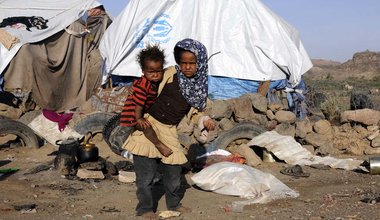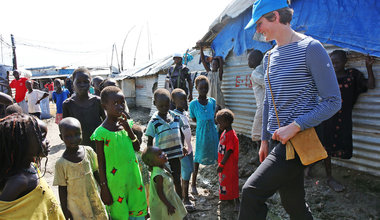Australia’s human rights record tainted by ‘regressive’ migration policies – UN expert
 Concluding his first official visit to Australia, the United Nations Special Rapporteur on the human rights of migrants said the country’s human rights standing has been tarnished by its “regressive” migration policies that fall “way behind” international standards.
Concluding his first official visit to Australia, the United Nations Special Rapporteur on the human rights of migrants said the country’s human rights standing has been tarnished by its “regressive” migration policies that fall “way behind” international standards.
“The punitive approach adopted by Australia towards migrants who arrived by boat has served to erode their human rights,” said Special Rapporteur François Crépeau in a news release issued by the Office of the UN High Commissioner for Human Rights (OHCHR).
“While Australia has the power to admit, deny entry or return migrants, it equally has an obligation to respect the human rights of all migrants in the process,” he added, noting that the country must respect the principles of non-refoulement, of non-discrimination and to act in the best interest of children.
According to the Special Rapporteur, mandatory and prolonged on- and off-shore immigration detention, obstacles in accessing justice and basic services such as health care, and discrimination in all areas of life as a result of one’s immigration status or that of their family are causing “immense suffering” to the migrants, as well as taking a toll on their mental health.
“The cure lies ultimately with Australia, which has the responsibility to settle those from the regional processing centres who are found to be refugees,” Mr. Crépeau stressed.
“Any agreement regarding third country resettlement must be meaningful – in terms of numbers, timeliness and opportunities to rebuild – and adhere to Australia’s international humanitarian and human rights obligations.”
Welcoming different visa options for migrants, including work visas, the UN rights expert cautioned that the temporary nature of such visas could increase the migrants’ vulnerability as they would often refrain from reporting, protesting and mobilising, in fear of having their visa cancelled, being detained or deported.
“I came across information about the exploitation of backpackers on working holiday visas, as well as of asylum seekers on bridging visas and students by employers in Australia,” he said, calling for strong oversight mechanisms to combat such abuse.
Increasing xenophobia in a country with rich history of migration is concerning
The rights expert also voiced concern at an increase in xenophobia and hate speech, despite Australia’s rich history of migration.
This, he said, has led to significant negative perceptions of migrants: “Politicians who have engaged in this negative discourse seem to have given permission to people on the street to act in xenophobic ways and to allow for the rise of nationalist populist groups.”
Underscoring that Australia must work to fight xenophobia, discrimination and violence against migrants, in both acts and speech, Mr. Crépeau added: “Maintaining section 18C of the Racial Discrimination Act sets the tone of an inclusive Australia, committed to implementing its multicultural policies and programmes and respecting, protecting and promoting the human rights of all.”
Section 18C of the Act refers to addressing offensive behaviour against someone due to their race, colour, national or ethnic origin.
Further in the news release, the expert hailed several migration policies adopted by the authorities, such as the resettlement program granting humanitarian protection to a high number of refugees and assisting them in their integration process, as well as the welcoming of 12,000 refugees from Syria.
Regional processing centre in Nauru
During his 18-day-long mission, the Special Rapporteur met with Government officials, civil society, trade unions, the country’s human rights commission as well as migrants themselves. He also visited on-shore detention centres and regional processing centres in the neighbouring island of Nauru.
The human rights expert will present a formal report on this mission to the UN Human Rights Council in June next year.
Independent experts and Special Rapporteurs are appointed by the Geneva-based Human Rights Council to examine and report back on a specific human rights theme or a country situation. The positions are honorary and the experts are not UN staff, nor are they paid for their work.
 UN
UN








